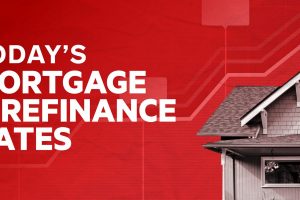Today's mortgage and refinance rates: June 5, 2021

Today’s mortgage and refinance rates are low overall, although fixed rates are significantly lower than adjustable rates. It could be a good day to lock in a historically low rate.
Mortgage rates shouldn’t drastically increase until employment and inflation in the US start to steadily improve. Marvin Loh, Senior Global Macro Strategist at State Street, told Insider that rates should stay low until late summer or even fall.
So if you aren’t ready to buy or refinance yet, you have a little more time to take advantage of low interest rates.
Popular Articles
How mortgage rates work
A mortgage interest rate is the fee a lender charges for borrowing money, expressed as a percentage. For example, you get a mortgage for $300,000 with an interest rate of 2.5%.
Mortgage rates can be either fixed or adjustable. A fixed-rate mortgage keeps your rate the same for the entire length of your loan. An adjustable-rate mortgage locks in your rate for the first few years or so, then changes it periodically. With a 7/1 ARM, your rate would stay steady for the first seven years, then shift annually.
The longer your mortgage term, the higher your rate will be. For instance, you’ll pay more on a 30-year mortgage than a 15-year mortgage. Longer terms do come with lower monthly payments, though, because you’re spreading out the repayment process.
Today’s mortgage and refinance rates
Today’s mortgage rates
| Mortgage type | Average rate today |
| 15-year fixed | 2.45% |
| 30-year fixed | 3.39% |
| 7/1 ARM | 4.0% |
| 10/1 ARM | 3.69% |
| 30-year FHA | 2.70% |
| VA mortgage loan | 2.76% |
Conventional rates from Money.com; government-backed rates from RedVentures.
Today’s refinance rates
| Mortgage type | Average rate today |
| 15-year fixed | 2.64% |
| 30-year fixed | 3.78% |
| 7/1 ARM | 4.45% |
| 10/1 ARM | 4.27% |
| 30-year FHA | 2.72% |
| VA mortgage loan | 2.78% |
Conventional rates from Money.com; government-backed rates from RedVentures.
Mortgage and refinance rates by state
Check the latest rates in your state at the links below.
Alabama
Alaska
Arizona
Arkansas
California
Colorado
Connecticut
Delaware
Florida
Georgia
Hawaii
Idaho
Illinois
Indiana
Iowa
Kansas
Kentucky
Louisiana
Maine
Maryland
Massachusetts
Michigan
Minnesota
Mississippi
Missouri
Montana
Nebraska
Nevada
New Hampshire
New Jersey
New Mexico
New York
North Carolina
North Dakota
Ohio
Oklahoma
Oregon
Pennsylvania
Rhode Island
South Carolina
South Dakota
Tennessee
Utah
Vermont
Virginia
Washington
Washington DC
West Virginia
Wisconsin
Wyoming
How to get the best mortgage rate
Here are a few steps you can take to get the best mortgage rate possible:
- Get a fixed-rate mortgage. You can ask your specific lender about its fixed rates vs. adjustable rates. But in general, fixed rates are starting lower than adjustable ones. Rates are also at all-time lows, so you would lock in a low rate instead of risking an increase later with an ARM.
- Look at your finances. The stronger your financial situation, the lower your mortgage rate should be. Look for ways to boost your credit score or lower your debt-to-income ratio, if necessary. Saving for a higher down payment also helps.
- Choose the right lender. Each lender charges different mortgage rates. Picking the right one for your financial situation will help you land a good rate.
How to choose a mortgage lender
First, think about what type of mortgage you want. The best mortgage lender will be different for an FHA mortgage than for a VA mortgage.
A lender should be relatively affordable. You shouldn’t need a super high credit score or down payment to get a loan. You also want it to offer good rates and charge reasonable fees.
Once you’re ready to start shopping for homes, apply for preapproval with your top three or four choices. A preapproval letter states that the lender would like to lend you up to a certain amount, at a specific interest rate. When you’re preapproved, your mortgage rate is locked in for 60 to 90 days. With a few preapproval letters in hand, you can compare each lender’s offer.
When you apply for preapproval, a lender does a hard credit inquiry. A bunch of hard inquiries on your report can hurt your credit score — unless it’s for the sake of shopping for the best rate.
If you limit your rate shopping to a month or so, credit bureaus will understand that you’re looking for a home and shouldn’t hold each individual inquiry against you.
About the authors
Laura Grace Tarpley is an editor at Personal Finance Insider, covering mortgages, refinancing, and lending. She is also a Certified Educator in Personal Finance (CEPF). Over her five years of covering personal finance, she has written extensively about ways to navigate loans.
Ryan Wangman is a reviews fellow at Personal Finance Insider reporting on mortgages, refinancing, bank accounts, bank reviews, and loans. In his past experience writing about personal finance, he has written about credit scores, financial literacy, and homeownership.
Best Mortgage Rates Today: Saturday June 5, 2021
Disclosure: This post is brought to you by the Personal Finance Insider team. We occasionally highlight financial products and services that can help you make smarter decisions with your money. We do not give investment advice or encourage you to adopt a certain investment strategy. What you decide to do with your money is up to you. If you take action based on one of our recommendations, we get a small share of the revenue from our commerce partners. This does not influence whether we feature a financial product or service. We operate independently from our advertising sales team.
Source: Read Full Article
